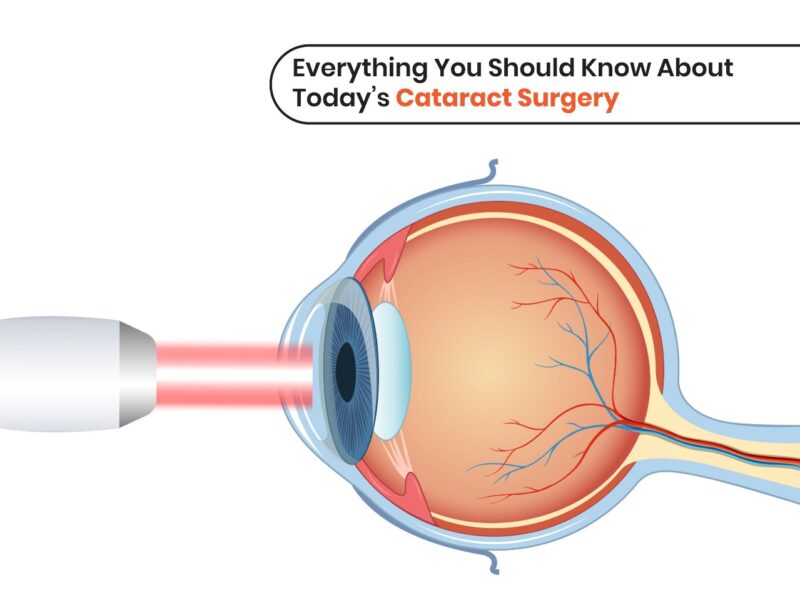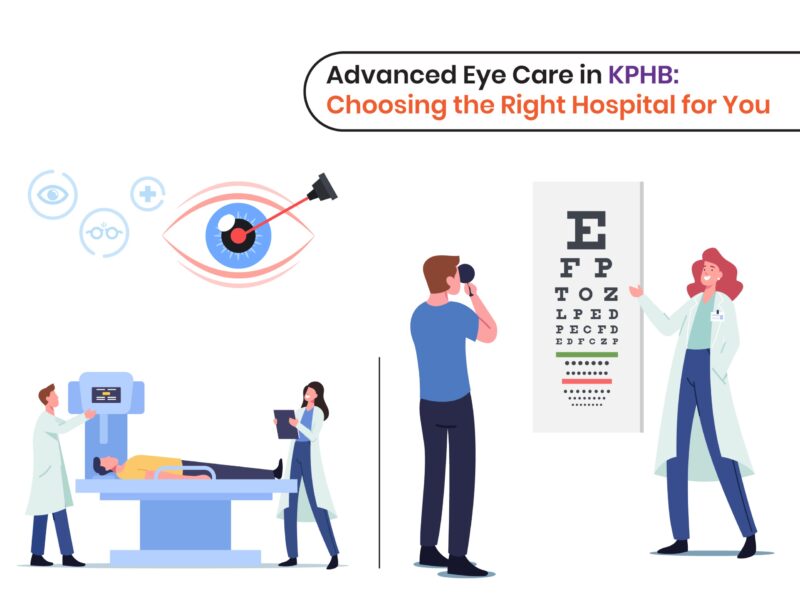Understanding Glaucoma: The Best Treatment Options Available in Hyderabad
Glaucoma, often called the silent thief of sight, is a progressive eye condition that can lead to irreversible vision loss if not addressed early. It damages the optic nerve, the critical link between the eye and the brain, often due to increased intraocular pressure (IOP). As one of the leading causes of blindness worldwide, particularly for those over 40, glaucoma demands timely detection and expert care to preserve vision.
In India, millions are at risk, yet many remain unaware of the condition until significant damage occurs. Fortunately, with advancements in medical technology and expert care, glaucoma can be effectively managed. At Medivision Eye Care in KPHB, Hyderabad, patients receive world-class treatment from highly skilled specialists using state-of-the-art diagnostic and therapeutic tools. This comprehensive guide explores glaucoma in detail, its types, causes, symptoms, diagnosis, treatment options, lifestyle management, and why Medivision Eye Care in KPHB is the premier destination for glaucoma care in Hyderabad.
Understanding Glaucoma
What Is Glaucoma?
Glaucoma is not a single disease but a group of eye conditions characterized by progressive damage to the optic nerve. This damage often results from elevated intraocular pressure caused by impaired drainage of aqueous humor, the fluid that maintains the eye’s shape and nourishes its structures. However, some forms of glaucoma can develop even with normal eye pressure, making regular screenings essential.
The condition typically begins by affecting peripheral (side) vision, often without noticeable symptoms in the early stages. As it progresses, it can impair central vision, impacting daily activities like reading, driving, or recognizing faces. Because glaucoma is asymptomatic in its early stages, it’s often detected only during routine eye exams, underscoring the importance of regular check-ups at a trusted facility like Medivision Eye Care in KPHB, Hyderabad.
Types of Glaucoma
At Medivision Eye Care, we specialize in diagnosing and treating all forms of glaucoma, including:
- Primary Open-Angle Glaucoma (POAG)
- The most common type, accounting for over 70% of cases.
- Develops gradually and painlessly due to slow clogging of the eye’s drainage canals.
- Often goes unnoticed until significant peripheral vision loss occurs.
- Regular screenings at Medivision Eye Care in KPHB are critical for early detection.
- Angle-Closure Glaucoma (Acute)
- A medical emergency caused by a sudden blockage in the eye’s drainage system.
- Symptoms include severe eye pain, blurred vision, nausea, vomiting, and halos around lights.
- Requires immediate treatment to prevent permanent vision loss.
- Medivision’s emergency services in KPHB ensure rapid intervention for acute cases.
- Congenital Glaucoma
- A rare condition present at birth due to abnormal development of the eye’s drainage system.
- Symptoms include cloudy corneas, light sensitivity, and excessive tearing.
- Medivision’s pediatric ophthalmology expertise in KPHB ensures early diagnosis and treatment for infants.
- Secondary Glaucoma
- Arises from other eye conditions, such as trauma, inflammation, cataracts, or prolonged steroid use.
- Requires a tailored approach to address both the underlying cause and elevated IOP.
- Medivision’s multidisciplinary team in KPHB provides comprehensive care for complex cases.
- Normal-Tension Glaucoma
- Occurs despite normal IOP levels, likely due to poor blood flow to the optic nerve.
- Requires specialized diagnostics to detect subtle changes.
- Medivision’s advanced imaging technologies ensure accurate diagnosis.
By offering expertise across all glaucoma types, Medivision Eye Care in KPHB, Hyderabad, delivers customized treatment plans to suit each patient’s unique needs.
Symptoms of Glaucoma
Glaucoma’s stealthy nature makes it challenging to detect without professional evaluation. Symptoms vary by type but may include:
- Gradual loss of peripheral vision: Often unnoticed until advanced stages.
- Tunnel vision: A hallmark of late-stage open-angle glaucoma.
- Blurred or hazy vision: Common in acute angle-closure glaucoma.
- Eye pain or pressure: Especially in acute cases.
- Redness or discomfort: A warning sign of angle-closure or secondary glaucoma.
- Halos around lights: Often reported in acute attacks.
- Headaches, nausea, or vomiting: Associated with sudden IOP spikes.
- Cloudy eyes or excessive tearing: Seen in congenital glaucoma.
Because early symptoms are subtle, routine eye exams at Medivision Eye Care in KPHB are vital, particularly for those with risk factors like age over 40, diabetes, or a family history of glaucoma. If you experience any of these symptoms, seek immediate care at Medivision’s KPHB facility for a thorough evaluation.
Causes and Risk Factors
Glaucoma primarily results from an imbalance in the production and drainage of aqueous humor, leading to increased IOP that damages the optic nerve. However, other factors, such as poor blood flow or genetic predispositions, can also contribute.
Key Risk Factors for Glaucoma:
- Age: Risk increases significantly after 40.
- Family history: A genetic predisposition raises the likelihood.
- Medical conditions: Diabetes, hypertension, and migraines increase risk.
- Eye-related factors: Previous injuries, surgeries, or thin corneas.
- Prolonged steroid use: Can elevate IOP over time.
- Ethnicity: African and Asian populations face higher risks.
- High myopia or hyperopia: Structural eye changes increase susceptibility.
Located in KPHB, Kukatpally, Medivision Eye Care frequently encounters patients with lifestyle-related risk factors like diabetes and hypertension. Our proactive screening protocols ensure early detection and intervention.
Diagnosis at Medivision Eye Care, KPHB
Accurate diagnosis is the cornerstone of effective glaucoma management. At Medivision Eye Care in KPHB, Hyderabad, we employ a comprehensive diagnostic approach using cutting-edge technology:
- Tonometry: Measures intraocular pressure to assess for elevated IOP.
- Gonioscopy: Examines the drainage angle to differentiate between open-angle and angle-closure glaucoma.
- Optical Coherence Tomography (OCT): Provides high-resolution images of the optic nerve and retinal nerve fiber layer.
- Visual Field Testing (Perimetry): Detects early peripheral vision loss.
- Dilated Eye Exam: Allows detailed inspection of the retina and optic nerve.
- Pachymetry: Measures corneal thickness to refine IOP readings.
These advanced tools enable Medivision’s specialists to detect glaucoma at its earliest stages, even before symptoms appear. Our KPHB facility is equipped to provide precise, personalized diagnoses, ensuring optimal treatment outcomes.
Treatment Options at Medivision Eye Care, KPHB
The goal of glaucoma treatment is to lower IOP and halt optic nerve damage. Medivision Eye Care in KPHB offers a full spectrum of treatment options, tailored to each patient’s condition and lifestyle.
1. Medications
Eye drops are often the first line of treatment for glaucoma. They work by either reducing aqueous humor production or improving its drainage. Common classes include:
- Prostaglandin Analogs: Increase fluid outflow (e.g., Latanoprost).
- Beta-Blockers: Decrease fluid production (e.g., Timolol).
- Alpha Agonists: Reduce production and enhance drainage.
- Carbonic Anhydrase Inhibitors: Lower fluid production.
- Combination Drops: Enhance efficacy for complex cases.
Medivision’s specialists provide detailed guidance on proper eye drop administration and monitor patients to ensure adherence and effectiveness.
2. Laser Therapy
For patients who don’t respond adequately to medications or require additional IOP control, laser treatments offer a minimally invasive solution:
- Selective Laser Trabeculoplasty (SLT): Enhances drainage in open-angle glaucoma.
- Laser Peripheral Iridotomy (LPI): Creates a small hole in the iris to relieve pressure in angle-closure glaucoma.
- Cyclophotocoagulation: Reduces fluid production in advanced cases.
Medivision’s KPHB facility is equipped with advanced laser technology, ensuring safe and effective procedures with minimal recovery time.
3. Surgical Interventions
When medications and lasers are insufficient, surgery may be necessary. Medivision Eye Care in KPHB offers both traditional and cutting-edge surgical options:
- Trabeculectomy: Creates a new drainage pathway to lower IOP.
- Glaucoma Drainage Devices (Shunts): Implants that facilitate fluid outflow.
- Minimally Invasive Glaucoma Surgery (MIGS): Advanced techniques like iStent or Hydrus Microstent, offering faster recovery and fewer complications.
Our surgical team in KPHB is highly experienced, ensuring precision and safety for even the most complex cases.
4. Pediatric Glaucoma Management
For congenital glaucoma, early intervention is critical. Medivision’s pediatric ophthalmologists in KPHB specialize in delicate procedures to correct drainage issues in infants, preserving vision from an early age.
Lifestyle Management for Glaucoma Patients
At Medivision Eye Care in KPHB, we emphasize a holistic approach to glaucoma care, combining medical treatment with lifestyle modifications to support long-term eye health. Patients are guided on:
- Nutrition: Incorporate antioxidant-rich foods like leafy greens, berries, and omega-3-rich fish to support optic nerve health.
- Exercise: Moderate activities like walking or yoga improve blood flow to the eyes without spiking IOP. Avoid high-resistance exercises like weightlifting.
- Stress Management: Practices like meditation and deep breathing reduce stress, which can exacerbate IOP.
- Eye Protection: Wear protective eyewear during activities and limit screen time to reduce strain.
- Regular Monitoring: Adhere to follow-up schedules to track IOP and optic nerve health.
By integrating these practices, Medivision ensures patients maintain optimal eye health alongside medical treatments.
Emerging Innovations in Glaucoma Treatment
Medivision Eye Care in KPHB stays at the forefront of glaucoma care by adopting the latest advancements:
- Sustained-Release Drug Implants: These reduce the need for daily eye drops, improving adherence and convenience.
- Neuroprotective Therapies: Emerging drugs aim to protect the optic nerve from further damage, complementing IOP-lowering treatments.
- Gene Therapy: Though still in research, gene-based treatments hold promise for addressing underlying causes of glaucoma.
- Artificial Intelligence (AI): AI-powered diagnostic tools enhance early detection by analyzing imaging data with unprecedented accuracy.
By embracing these innovations, Medivision ensures patients in KPHB, Hyderabad, benefit from the most advanced care available.
Why Choose Medivision Eye Care in KPHB, Hyderabad?
Medivision Eye Care in KPHB stands out as the premier destination for glaucoma treatment in Hyderabad for several reasons:
- Expert Glaucoma Specialists: Our team of ophthalmologists has extensive experience in diagnosing and treating all forms of glaucoma.
- Cutting-Edge Technology: From OCT to laser systems, our KPHB facility is equipped with the latest tools for precise diagnosis and treatment.
- Personalized Care: Every patient receives a tailored treatment plan based on their condition, lifestyle, and needs.
- Convenient Location: Situated in KPHB, Kukatpally, Medivision is easily accessible to residents of Hyderabad and surrounding areas.
- Trusted Reputation: With decades of excellence in eye care, Medivision has earned the trust of thousands of patients.
- Holistic Approach: We combine medical, surgical, and lifestyle interventions for comprehensive care.
- Emergency Services: Our KPHB facility is equipped to handle acute glaucoma cases, ensuring timely intervention.
Whether you’re seeking routine screenings or advanced surgical care, Medivision Eye Care in KPHB is your trusted partner in preserving vision.
FAQs:
Q1: Can glaucoma be cured permanently?
No, glaucoma is a chronic condition, but with early detection and treatment at Medivision Eye Care in KPHB, it can be effectively managed to prevent vision loss.
Q2: How often should I get my eyes checked for glaucoma?
Adults over 40 or those with risk factors should undergo comprehensive eye exams every 1–2 years at Medivision in KPHB.
Q3: What treatment options are available at Medivision Eye Care?
We offer medications, laser therapies (SLT, LPI), and surgeries (trabeculectomy, MIGS, shunts) tailored to each patient’s needs.
Q4: Is glaucoma treatment painful?
Most treatments, including eye drops and laser procedures, are painless. Surgeries are performed under anesthesia for patient comfort.
Q5: Why is Medivision Eye Care in KPHB the best choice for glaucoma treatment?
Our experienced specialists, advanced technology, personalized care, and convenient location make us the top choice in Hyderabad.
Q6: Can lifestyle changes help manage glaucoma?
Yes, a healthy diet, regular exercise, stress management, and adherence to treatment can significantly support glaucoma management.
Q7: What should I do if I experience sudden eye pain or vision changes?
Seek immediate care at Medivision Eye Care in KPHB, as these could indicate acute angle-closure glaucoma, a medical emergency.
Conclusion
Glaucoma is a serious condition that requires lifelong management, but with early detection, advanced treatments, and expert care, vision loss can be prevented or minimized. At Medivision Eye Care in KPHB, Hyderabad, we combine cutting-edge technology, experienced specialists, and a patient-centered approach to deliver the best glaucoma treatment in the region.
Whether you’re at risk due to age, family history, or medical conditions, or if you’re experiencing symptoms, don’t wait to schedule a consultation with Medivision Eye Care in KPHB today. Our team is dedicated to safeguarding your vision and helping you live with confidence. Trust Medivision for world-class glaucoma care in Hyderabad.



